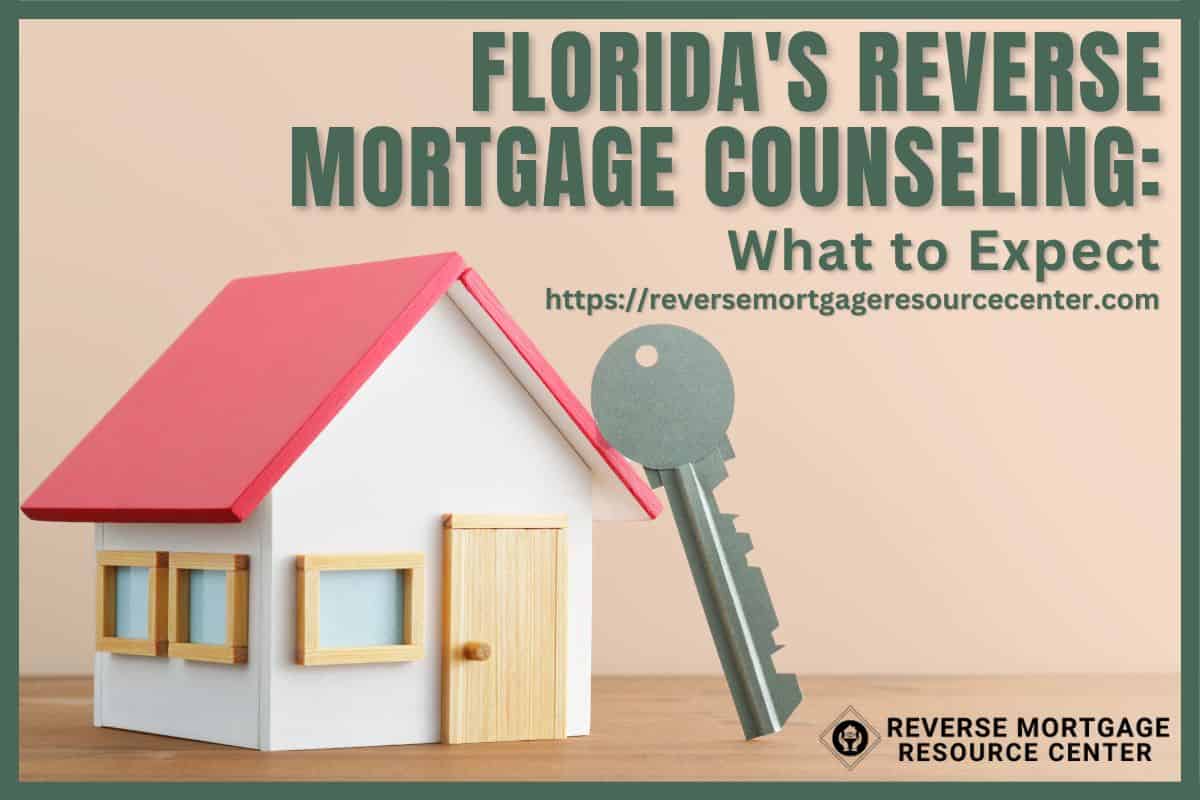Florida’s Reverse Mortgage Counseling: What to Expect
For Florida homeowners 62 years and older, reverse mortgages can be an attractive financial tool to access the equity built up in their homes. With the cost of living on the rise, these unique financial instruments can provide a lifeline for seniors looking to supplement their income, cover healthcare expenses, or finance home improvements. However, before diving into reverse mortgages, it’s essential to understand the process and ensure you are well-informed. Florida’s reverse mortgage counseling plays a pivotal role in this journey. In this article, we will explore what to expect when seeking reverse mortgage counseling in the Sunshine State.
Understanding Reverse Mortgages
Before delving into the details of reverse mortgage counseling in Florida, it’s crucial to have a firm grasp of what a reverse mortgage is and how it works. In essence, a reverse mortgage is a loan that allows homeowners to convert a portion of their home equity into cash, without the need to sell their homes or move out. The loan is due and payable when the borrower(s) no longer live in the home, either due to selling the house, moving to a different primary residence, or passing away. This makes reverse mortgages an attractive option for seniors looking to age in place while accessing their home’s equity.
There are three primary types of reverse mortgages available:
- Home Equity Conversion Mortgage (HECM): This is the most common type of reverse mortgage insured by the Federal Housing Administration (FHA). HECMs offer flexible options, including receiving the loan proceeds as a lump sum, a line of credit, fixed monthly payments, or a combination.
- Proprietary Reverse Mortgages: Private loans from mortgage companies, banks, and credit unions. They are not subject to the same federal regulations as HECMs, which can lead to more significant loan amounts for those with higher home values.
- Single-Purpose Reverse Mortgages: These are usually offered by state or local government agencies or nonprofit organizations and are specifically designed for particular purposes, such as home repairs or property taxes.
Now that we have a basic understanding of reverse mortgages, let’s explore the importance of reverse mortgage counseling in Florida.
The Role of Reverse Mortgage Counseling
Reverse mortgage counseling is a mandatory step in obtaining a reverse mortgage in Florida, as in most other states. The primary goal of this counseling is to provide homeowners with the information they need to make an informed decision about whether a reverse mortgage is right for them. It is designed to protect the borrower’s interests and ensure they understand the terms, costs, and potential consequences of a reverse mortgage.
Here’s what you can expect from reverse mortgage counseling in Florida:
Education and Information
One of the first things you’ll encounter during reverse mortgage counseling is a comprehensive education on how reverse mortgages work. A certified reverse mortgage counselor will explain the different types of reverse mortgages available, the benefits and drawbacks, and the responsibilities associated with obtaining a reverse mortgage.
Financial Assessment
The counselor will conduct a financial assessment to determine if you meet the basic eligibility requirements for a reverse mortgage. This assessment takes into account your income, expenses, and existing debts. It ensures that you can maintain your property and meet your obligations, such as property taxes and homeowner’s insurance, which are necessary to keep the reverse mortgage in good standing.
Loan Comparisons
You’ll receive information on various loan options, helping you understand the terms, interest rates, and potential costs associated with each one. This knowledge will enable you to choose the reverse mortgage that best aligns with your financial goals and needs.
Alternatives to Reverse Mortgages
Reverse mortgage counseling in Florida will also explore alternative financial solutions that might better suit your circumstances. These may include government assistance programs, home equity lines of credit, or downsizing your residence.
Legal and Ethical Aspects
Your counselor will discuss the legal and ethical aspects of reverse mortgages, including potential risks and benefits. They will emphasize the importance of understanding the loan agreement and any potential consequences for you and your heirs.
Questions and Clarifications
The counseling session allows you to ask questions and seek clarification on any concerns. It’s essential to ensure that you fully comprehend the implications of a reverse mortgage and its effects on your financial situation.
Finding a Qualified Reverse Mortgage Counselor
When seeking reverse mortgage counseling in Florida, it’s crucial to work with a qualified and HUD-approved counselor. The U.S. Department of Housing and Urban Development (HUD) oversees the counseling process to ensure homeowners receive accurate and unbiased information. Here are the steps to find a qualified counselor:
HUD’s Counselor Locator
Visit the HUD website and use their “Find a Housing Counselor” tool to search for approved counselors. You can narrow down your search by specifying your location and the type of counseling you need, which, in this case, would be “Reverse Mortgage Counseling.”
Choose a Local Agency
Many housing counseling agencies in Florida offer reverse mortgage counseling services. These agencies are typically affiliated with HUD and have counselors with the necessary certifications to guide you through the process. You can contact them directly to schedule a counseling session.
Verify Credentials
When selecting a counselor, ensure they are approved by HUD, which ensures they adhere to the department’s standards and regulations. You can verify their credentials by checking the HUD counselor list or contacting HUD directly.
The Importance of Being Prepared
Before attending your reverse mortgage counseling session in Florida, it’s beneficial to be well-prepared. Here are some key steps to ensure you get the most out of your counseling experience:
Gather Necessary Documents
Have all relevant financial documents on hand, including tax returns, bank statements, and mortgage information. The counselor will use this information to assess your financial situation.
Prepare Questions
Think about the questions you want to ask during the counseling session. Don’t be afraid to inquire about any aspect of the reverse mortgage process that you find unclear or confusing.
Understand Your Goals
Have a clear understanding of your financial goals and what you hope to achieve with a reverse mortgage. This will help the counselor tailor their guidance to your specific needs.
Be Open to Alternatives
While reverse mortgage counseling is an essential step for those considering this financial tool, remain open to the possibility that a reverse mortgage may not be the best option for you. Counselors may identify alternative strategies that better suit your financial circumstances.
The Counseling Session
Your reverse mortgage counseling session in Florida will typically last around 90 minutes to two hours. During this time, your HUD-approved counselor will provide detailed information on reverse mortgages, discuss your financial situation, and answer any questions. It’s essential to be attentive and take notes during the session.
Key topics that will be covered during the counseling session include:
Eligibility and Requirements
The counselor will explain the eligibility criteria for a reverse mortgage in Florida, including age requirements, property types, and occupancy rules.
Loan Types and Features
You’ll learn about the different types of reverse mortgage loans available and their specific features. The counselor will explain the pros and cons of each option, helping you make an informed choice.
Costs and Fees
Understanding the costs of reverse mortgages is a crucial part of the counseling session. The counselor will break down the fees involved, such as origination fees, mortgage insurance premiums, and servicing fees. You’ll also learn how these costs impact the overall loan balance.
Repayment Options
Reverse mortgages have unique repayment terms. You’ll explore how the loan becomes due and payable, typically when the homeowner(s) move out of the home or pass away. Your counselor will discuss various repayment options, such as selling the home, paying off the loan with other assets, or having your heirs assume the loan.
Consequences and Risks
Reverse mortgages have potential consequences and risks you must be aware of. The counselor will explain how a reverse mortgage may affect your heirs and your estate. You’ll also learn about the risk of foreclosure if you don’t meet your ongoing obligations, like being current on property taxes and homeowner’s insurance.
Alternatives and Financial Assessment
Your counselor will guide you through assessing your financial situation and evaluating whether a reverse mortgage is the right choice for you. They’ll also discuss alternative options that may better suit your needs.
Legal and Ethical Considerations
Understanding the legal and ethical aspects of reverse mortgages is crucial. The counselor will clarify any legal obligations and ethical responsibilities you have as a borrower.
Counseling Certificate
Upon completing the counseling session, you’ll receive a counseling certificate. This certificate is necessary for moving forward with your reverse mortgage application. Keep it safe, as you’ll need to provide it to your lender as proof of counseling.
Making an Informed Decision
After the counseling session, you should have a comprehensive understanding of reverse mortgages and the potential impact on your financial situation. It’s essential to take your time to review the information provided and consider the following factors:
Your Financial Goals
Assess whether a reverse mortgage aligns with your financial goals. Do you need access to additional funds, or are there other means of achieving your objectives?
Alternatives
Consider the alternatives to a reverse mortgage discussed during the counseling session. Are there other financial solutions that might better suit your needs?
Consult with Trusted Advisors
It’s often wise to consult with trusted financial advisors or family members before deciding. They can provide valuable insights and help you weigh the pros and cons.
Comparing Loan Offers
If you proceed with a reverse mortgage, obtain loan offers from different lenders and carefully compare the terms, including interest rates, fees, and repayment options. This will ensure you get the best deal possible.
Initiating the Loan Process
Once you’ve made an informed decision to move forward with a reverse mortgage, you’ll need to take the following steps:
Select a Lender
Choose a reputable reverse mortgage lender that offers the terms and conditions that best align with your needs. Remember to consider the information provided during counseling and the comparisons you made.
Complete an Application
You’ll need to complete a reverse mortgage application, providing the necessary financial information and documentation as the lender requires.
Underwriting and Approval
The lender will assess your application and conduct a financial review to determine if you meet their criteria. This process typically involves a home appraisal, credit check, and additional financial evaluations.
Closing
If your application is approved, you’ll move to the closing phase. During closing, you’ll sign the loan documents and discuss disbursement options, such as receiving the loan proceeds as a lump sum, line of credit, fixed monthly payments, or a combination.
Disbursement
Once the loan is closed, you can receive the funds in your chosen disbursement method. Remember that you are responsible for paying property taxes, and homeowner’s insurance, and maintaining the property to keep the loan in good standing.
REVERSE MORTGAGE RESOURCE CENTER ~LIVE LIFE ON YOUR TERMS~
Our Lending Team has been serving our clients since 2004. We are passionate about serving our clients with integrity to help them achieve their financial goals.







